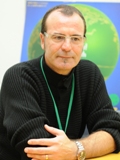2010.10.25
[Interviews]
ŌĆ£Primary!ŌĆØ Interview with Francisco Alfonsin (Script writerand Actor) and Dan Ukenen (Assistant Director) (10/25)


©2010 TIFF
---I was really surprised to see how vividly the children are portrayed. The relationship among teachers on the sideline is also thought-provoking, and I was drawn to the film before I knew it.
Francisco Alfonsin (Alfonsin): The director, Ivan Noel, taught art at a primary school for a year, which led to the production of this film. The children in the film are the pupils he taught back then. I wanted to show the creativity, sincerity and honesty of children as they are, so before we prepared the script, we filmed a real lesson for 30 to 40 minutes to capture the children on lens. It wonŌĆÖt work out as a film without some story, so we characterized the art teacher, Spanish teacher and math teacher, but that only provides a frame, and the children are the true protagonists.

©2010 TIFF
---There is a scene where a child with ADHD is behaving hyperactively, that was like a documentary.
Alfonsin: That child does suffer from it and needs medication every day at 2 oŌĆÖclock even during a lesson. That is a true story.
---Does that mean the lesson scenes are all real?
Dan Ukenen (Uneken): The film is a recreation of real events as Ivan taught art at primary school. WeŌĆÖve asked children to do exactly the same things again for the lesson scenes.

©2010 TIFF
---I was taken aback by the childrenŌĆÖs rich creativity. They draw a picture of a tree, and explain with a logic that adults wouldnŌĆÖt even imagine, for example, ŌĆ£The root is crawling underground to go and get back what people took away from themŌĆØ, or ŌĆ£The tree is angry because the mother bird does not look after the baby birdsŌĆØ.
Ukenen: Both the pictures and the explanations are from IvanŌĆÖs experience a year ago.
---No wonder why it is so realistic. I would like to ask you about the interesting teachersŌĆÖ episode. The protagonist and an art teacher Jose Maria and the Spanish teacher Angustias are similarly unfortunate in terms of their relationship with their children, but their lives are portrayed contrastingly. One establishes a new relationship, while the other struggles at it. Did something particular inspire you for the portrayal with many connotations?
Alfonsin: All the teachers in the film are based on what Noel saw and heard over 20 years as a teacher. In that sense, each teacher is based on a model in real life.
---If the pupils are real pupils, are the teachers performed by real teachers, too?
Alfonsin: A few of them are real teachers. Four, including myself, are actors, who played the art, maths, and Spanish teachers as well as a psychological counsellor. The headmaster is played by a real psychiatrist at a prison in Serbia. In addition, a few parents are real parents from school.
---It is surprising to have managed such realistic staff meetings, etc. between the actors and amateurs. Teachers sit around the table and discuss all sorts of issues, sometimes in a highly-charged atmosphere and other times harmoniously, and I could almost feel I was present at the meeting.
Alfonsin: It is the directorŌĆÖs belief that truth cannot be told if the actors come to the fore (laugh).
---Parents turn up at a parents meeting and they start eating bananas at once. How did you come up with ideas like that?
Alfonsin: A boy, called Carlos, is said to have a special ability to see into peopleŌĆÖs mind, and then thought about something he could have seen.
---Carlos is the boy who wants to be a magician, and played the role of a wizard at the school play?
Alfonsin: Magician could be the god who knows the truth (laugh). From CarlosŌĆÖs point of view, parents who say old-fashioned things at parentsŌĆÖ evening are no better than monkeys, thatŌĆÖs why they start eating bananas all at once.
---In that scene, a teacher suggests to take children to the river and teach them maths while doing some fun things, too. But the parents object for fear of any accidents. This kind of integrated study has been tried in various forms in Japan, too. It was a memorable scene as it cynically portrays that teachers wishes alone may not always work out. Do things like this happen often in Spain?
Ukenen: It is very conservative when it comes to education in Spain, so people are often doubtful about many new educational methods. ThatŌĆÖs why I receive requests from teachers at schools that deal with older children than in the film for reference.
(Interviewed by Seijin Akatsuka)
Primary!
ŌåÆFilm Infomation




